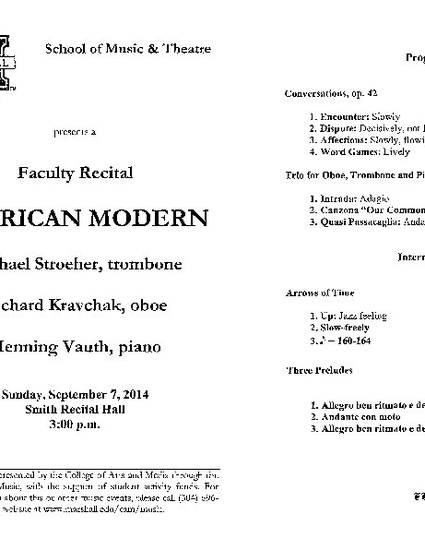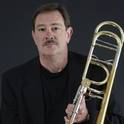
Michael Stroeher, trombone
Richard Kravchak, oboe
Henning Vauth, piano
Program Notes
Conversations
John La Montaine received his musical education at the Eastman School of Music and the Julliard School, where he studied composition with, among others, Howard Hanson and Nadia Boulanger. An accomplished pianist, he served as pianist and celestist in the NBC Symphony under Arturo Toscanini from 1950 to 1954. He was awarded the 1959 Pulitzer Prize in Music for his First Piano Concerto, which the jury cited for "true originality." In 1961 His overture From Sea to Shining Sea was the first work to be commissioned for a presidential inauguration, and was performed by the National Symphony at the inauguration of John F. Kennedy.
Conversations was commissioned by the National Federation of Music Clubs in 1977, and was composed in a way that makes the piece adaptable to a number of instruments, including clarinet, flute, violin, trombone, marimba, and viola. The titles of the individual conversations are fairly self-explanatory; I think of them somewhat as "scenes from a marriage," and the different types of conversations that occur. The style of the piece can be characterized as mid-twentieth century American Contemporary, utilizing an extended tonal language with rhythmic variety and drive.
Trio for Oboe, Trombone and Piano
Ronald Roseman was an active performer on oboe, English horn and shawm in the New York City where he served as acting principal oboist with the New York Philharmonic, principal oboist with the New York Chamber Symphony, Bach Aria Group, and as oboist with the New York Woodwind Quintet. He began composing at an early age, and studied composition with Elliott Carter and Henry Cowell.
The Trio was written for the Norfolk Chamber Music Festival and premiered there by Roseman, trombonist John Swallow, and pianist Seymour Lipkin, all colleagues at the Yale School of Music. Although thoroughly modern in his melodic, harmonic, and rhythmic language, Roseman hearkens back to the music of the Renaissance in his use of imitation: the second movement entitled "Canzona" "Our Common Roots" makes use of the typical opening long-short-short canzona rhythm typical of of Gabrieli. The third movement, in the form of a passacaglia (a set of variations over a recurring bass line), has the oboist and trombonist pay in quarter steps, which, because of the acoustical qualities of just intonation (another practice of the Renaissance and Baroque), fits with the pitches in the equal-temperament piano.
There is an interesting personal connection of today's performers to the Trio: Richard Kravchak studied chamber music with Ronald Roseman at the Julliard School, and Michael Stroeher studied trombone with John Swallow at the New England Conservatory.
Arrows of Time
Richard Peaslee has written extensively for Broadway, off-Broadway and the London theatre as well as for various dance companies and the concert hall. His compositions are strongly influenced by his study with jazz composer Bill Russo at the Julliard School, and his compositions for jazz band have been performed by Stan Kenton, Gerry Mulligan and the London Jazz Orchestra. His film and television scores include Time/Life's Wide World of Animals and the Joseph Campbell/Bill Moyers series The Power of Myth for which he received an Emmy nomination.
Peaslee states about Arrows of Time, "Having once played trombone in high school and college bands it has always been a favorite instrument of mine. One of my main influences has been Bill Russo's trombone writing for the Stan Kenton Orchestra, spearheaded by Frank Rosolino's spectacular solos." Arrows of Time was written for and premiered by Joseph Alessi, principal trombonist of the New York Philharmonic. "As for the title," Peaslee states, "the term appears in Hawking's A Brief History of Time which I had been reading while writing the piece. Little more can be said in explanation other than I liked it as a title."
Three Preludes
George Gershwin had originally intended to follow in the footsteps of J.S. Bach and Frederic Chopin, and compose 24 preludes for piano, one in each key. He managed to complete seven of them, but the publisher was interested in only three, although two others were rearranged for violin and piano and published as Short Story. The Preludes make use of many elements of jazz style: the first movement is based on the opening blues motive, with an underlying Latin rhythmic base; the second, Gershwin referred to as a "a sort of blues lullaby" (although I think of it more as a late-night street scene); the third returns to a Latin rhythmic style.
Available at: http://works.bepress.com/michael_stroeher/32/
